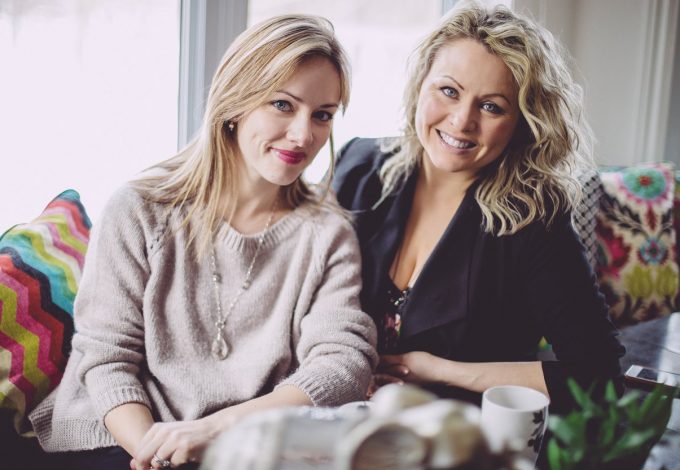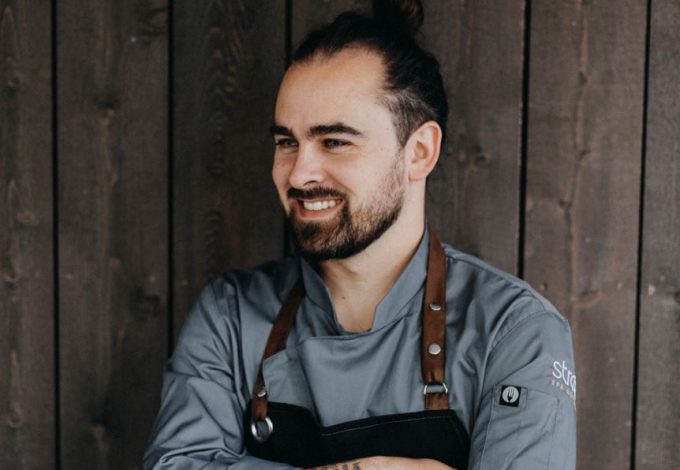THE IMPORTANCE OF RECOGNITION — Host, cultural columnist, writer, and author Valérie Roberts became known to the general public in 2007. Since 2015, she has been in a relationship with chef Martin Juneau. She is the step-mother of his two children, and now a new mother of a little girl, Lucie.
In recent years, Valérie gradually became a role model and a spokesperson for step-parents in Quebec. In 2020, her book La blonde de papa was released in bookstores, bringing recognition and reassurance to step-parents. In May 2021, with the support of the Minister of Families, Mathieu Lacombe, Valérie established National Step- Parents’ Day to celebrate those who often play a fundamental role in the lives of children. With authenticity and kindness, she explains her journey and her mission to us.
Why did you decide to create a day from scratch rather than amalgamating the celebration with the existing Mother’s Day and Father’s Day?
“The idea for National Step-Parents’ Day emerged in my mind when I started spending time with my step-daughters six years ago. When I met them, Simone was five and Léonie was two. They were young, but very early on, we had discussions about the place I was taking in relation to their mother. In the beginning, whenever we passed people in the street and they complimented me on “my daughters,” Simone and Léonie would automatically reply, “She’s not our mother! She’s not our mother!” But the more time passed, the less they felt the need to say it.
Anyway, everyone knows I’m not their mother. In any event, in our family, we know it very well! The girls associate my role with that of a second mother, but the term ‘mom’ isn’t for me. I felt like every time the girls acknowledged my presence in their lives on Mother’s Day, they felt like they were betraying their mom a bit, which is quite normal.
“So, it seemed easier for the children to create another day entirely, to avoid conflicts of loyalty and uneasiness. I found it ridiculous and absurd that there was a World Nutella Day and a World Procrastination Day, but not one for people, men and women, who are involved body and soul in a relationship where the child isn’t their own, but who treat them that way.”
With the release of your book, people have found a waypoint…
“Yes, because it’s a complicated situation. Overnight, you have to find your place as a human being with your lover, but also with their children, and with the ex-husband/wife, who is the children’s other parent. Many questions arise at the same time: Will I be accepted by all the family members? Will I be able to discipline the children? Do I want to share my values with them? It’s a big challenge, because it all depends on the parent you’re in a relationship with, but also on the one you’re not. Although they aren’t in your romantic relationship or your family, they’re still part of the circle of this blended family.
In short, it’s all very complicated, so when no one talks about it either and it’s hard to find resources or books on the subject, it’s normal to feel alone!”
The girls associate my role with that of a second mother, but the term “mom”isn’t for me.
Quite rightly! Do you think it’s necessary to set up certain infrastructures to provide support for step-parents?
“Step-parenthood affects a large number of families in Quebec, but we prefer to act as if it doesn’t exist that much. It’s a bit taboo. There are many things that are in place, except they aren’t widely known, and even if you do some research, they’re not easy to find. In particular, in recent years, I discovered the Réseau pour un Québec Famille and the Fédération des associations de familles monoparentales et recomposées du Québec (FAFMRQ). However, not everyone feels like consulting an association to improve in their role as a step-parent. It’s an investment of time that might scare some people off. Going to the bookstore and buying a book, for example, is much less of a commitment.
There’s a wide variety of resources for new mothers and those preparing to experience motherhood. But not for step-parents. Even the word ‘step-parenthood’ doesn’t really exist. We have ‘joint parenthood,’ ‘LGBT parenthood’… Most types of parenthood have a term to define them, but not ‘step-parenthood.’
That’s why I’m working with the Office québécois de la langue française to get it added, and I also asked them to question the French terms ‘belle-parentalité,’ ‘beau-parent,’ ‘belle-mère,’ and ‘beau-père.’ Because whenI created the day, people would write to me to tell me, ‘I love my son-in-law,’ since ‘beaux-parents’ means both ‘step-parents’ and ‘in-laws’ in French. But no, we’re not talking about that! It’s strange that there isn’t a specific word. In English, there’s ‘step-father’ and ‘step-mother,’ and ‘father-in-law’ and ‘mother-in-law.’ In Spanish, too, there are different terms, and in many languages around the world ultimately, but not in French.”
In your opinion, why don’t we talk about this reality very much?
“We still really aspire to have a loving relationship that will never end and to keep the family together, so it’s hard to admit that there has been an ‘explosion’ within a family. I also think that the conflicts that may exist between a step-father and a father, and between a step-mother and a mother, feed this taboo.
I’ve also already publicly questioned whether step-parents should have rights with respect to the children. I remember getting a lot of outraged and surprised comments from parents. As if step-parenthood takes something away from the biological parents, while they will always remain the child’s parents. And we say all the time that it takes a village to raise a child, but my God, we sure don’t want it to be a step-parent! Why?
I’ve had step-mothers in my life myself: my parents separated when I was six years old. Did I have affinities with some of them? Are there women I kept in my life? Yes, of course. But did they replace my mother? Never! My mother is my mother.”
What can be done to preserve the well-being of the children while creating a blended family, which is an overwhelming stage for everyone?
“I don’t think there’s any secret. You just have to remember that they are at the centre of the family, that they are the ones being dragged from one house to the other, and that you, as a step-parent, are coming into their daily life, but they didn’t choose you! It’s about being able to be a part of their lives without disrupting them too much, listening to their needs and what they want to tell you. Children are really smart, and they understand a lot more than we think. Something we established from the start was this desire to speak openly with the girls. ‘When somebody in the street tells you that you’re my daughter and that you’re beautiful, what do we do? Does it upset you? Does it bother you? Would you rather we answer that I’m not your mother and correct them? Or, since you and I know very well that you’re not my daughter and I’m not your mother, should we have fun with it instead and joke about it?’ The children didn’t ask for their parents to be separated or for another adult to come into their home, so you have to try to make the transition as smooth as possible.”
Do you think having had separated parents yourself helps you be a better step-parent?
“There are models of step-mothers I’ve had which I don’t want to copy, and others I’d like to be inspired by. The step-mother I’ve had for the past 21 years is an amazing woman who never had any children, and who always considered my sister and me to be hers. And that was nothing against our mother. On the contrary: that was everything for us. My father lives in the United States, so when we went to their house, it was ‘us.’ It was ‘our girls.’ So, when I met Martin’s daughters, I asked them if they were comfortable with me saying ‘my daughters’ and ‘mine’ when I talked about them. Because, for me, I always found it flattering when my step-mother would say I was her daughter. It meant she was proud of me and that she loved me.
I think if we talked about blended families more and saw more examples in the media, it could be inspiring. It’s just important to see more of it.”







